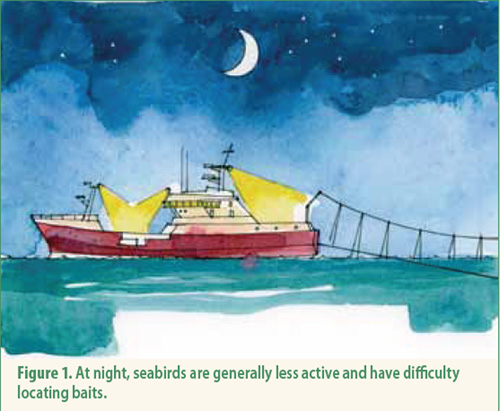Two international meetings held last month have held productive discussions on seabird bycatch. ACAP was in attendance at both meetings.
The joint Tuna Commissions' (tRFMOs) ‘Kobe II' Bycatch Workshop held over 23-25 June in Brisbane, Australia agreed to establish a Joint technical Working Group, consisting of two to three participants from each tRFMO. The working group would aim to seek the assistance of expert advice from both IGOs and NGOs to facilitate cooperation and coordination on bycatch issues so as to provide best-practice advice that is consistent across all high-seas tuna fisheries. Agreement was also reached on the tRFMOs establishing a centralised source of information on bycatch mitigation measures. A range of other recommendations was made, encouraging tRFMOs to implement their responsibilities under relevant international instruments. See also http://www.birdlife.org/news/news/2010/06/Its-time-for-a-turn-on-tuna.html.
At the 16th Meeting of the Scientific Council of the Bonn Convention on Migratory Species (CMS) during 28-30 June in Bonn, Germany a Bycatch Working Group discussed the report of the CMS Scientific Councillor for Bycatch, Barry Baker. Noting the progress that had already been achieved with undertaking global reviews of both bycatch and mitigation measures in longline and trawl fisheries, it was agreed that the CMS should sponsor similar reviews for gillnet fisheries. Click here for a summary of the meeting's deliberations.
Unlike longline and some trawl fisheries, and as far as it is currently known, gill (and drift) net fisheries do not impact seriously on ACAP-listed albatrosses and petrels. However, this would be likely to change if deep-diving petrels, such as the Critically Endangered Balearic Shearwater Puffinus mauretanicus, were listed on the Agreement (click here to access ACAP news stories on this bird).
The CMS Bycatch Working Group also encouraged closer links between ACAP and the CMS, including by facilitating attendance of their representatives at meetings of selected tuna RFMOs.
The CMS Working Group also noted the difficulty of getting the Commissions of RFMOs to adopt and implement advice provided by their own Scientific Committees and other technical working groups. In many cases, it was clear that there is poor coordination between fisheries and conservation agencies within governments, leading to conflicting positions being expressed by a State at inter-governmental fishery and conservation fora. The Working Group encouraged CMS Parties to address this problem by ensuring their delegations are fully briefed on bycatch issues and on the need for urgent action to implement necessary changes to fishing practices.

See earlier ACAP news stories on these two meetings at:
and
http://www.acap.aq/latest-news/tuna-bycatch-workshop-to-be-held-this-month-in-brisbane-australia
John Cooper ACAP Information Officer 7 July 2010

 English
English  Français
Français  Español
Español